Free Online Productivity Tools
i2Speak
i2Symbol
i2OCR
iTex2Img
iWeb2Print
iWeb2Shot
i2Type
iPdf2Split
iPdf2Merge
i2Bopomofo
i2Arabic
i2Style
i2Image
i2PDF
iLatex2Rtf
Sci2ools
143
Voted
JMLR
2012
2012
Detecting Network Cliques with Radon Basis Pursuit
In this paper, we propose a novel formulation of the network clique detection problem by introducing a general network data representation framework. We show connections between our formulation with a new algebraic tool, namely Radon basis pursuit in homogeneous spaces. Such a connection allows us to identify rigorous recovery conditions for clique detection problems. Practical approximation algorithms are also developed for solving empirical problems and their usefulness is demonstrated on real-world datasets. Our work connects two seemingly different areas: network data analysis and compressed sensing, which helps to bridge the gap between the research of network data and the classical theory of statistical learning and signal processing.
Approximation Algorithms | Basis Pursuit | JMLR 2012 | Programming Languages | Representation Framework |
| Added | 27 Sep 2012 |
| Updated | 27 Sep 2012 |
| Type | Journal |
| Year | 2012 |
| Where | JMLR |
| Authors | Xiaoye Jiang, Yuan Yao, Han Liu, Leonidas J. Guibas |
Comments (0)

